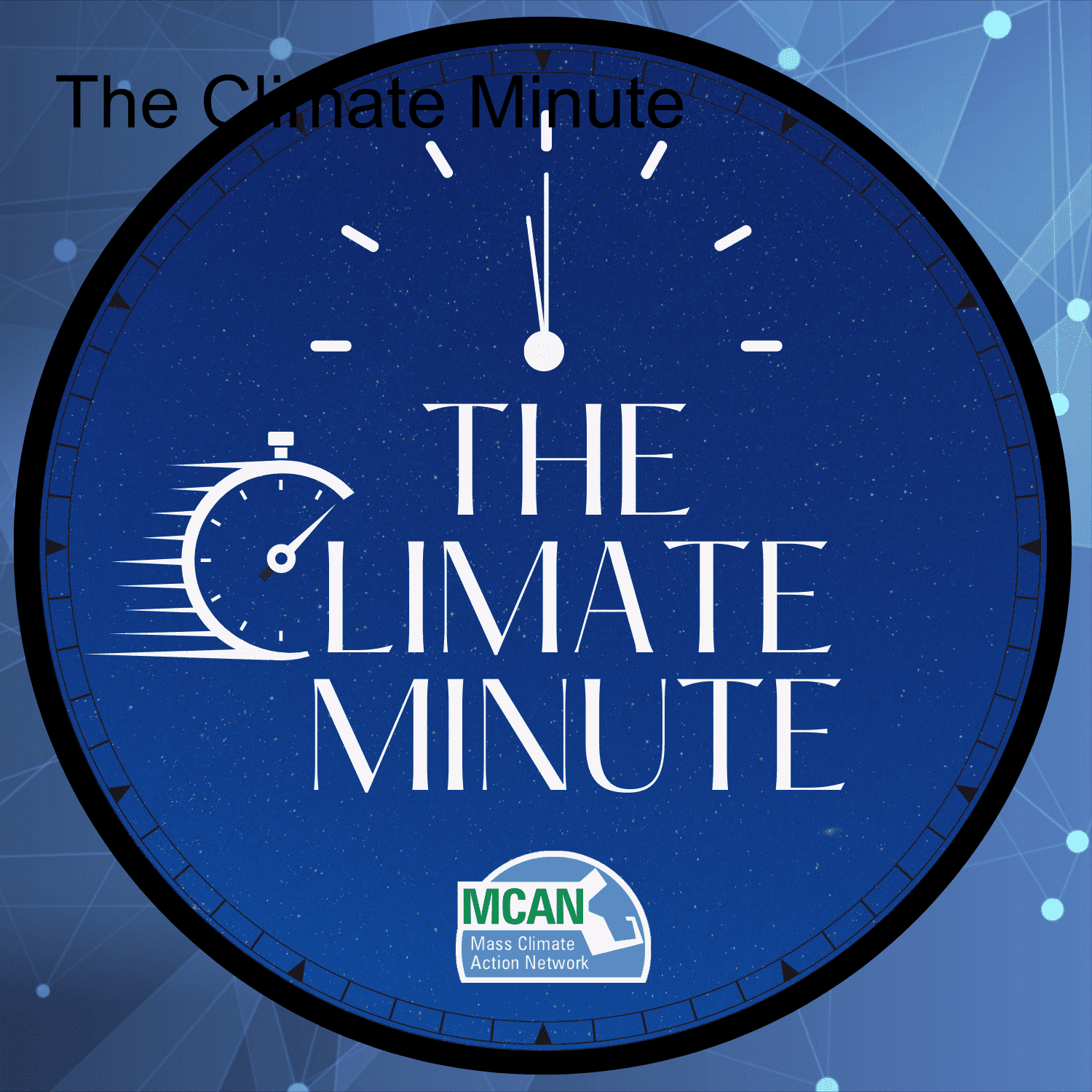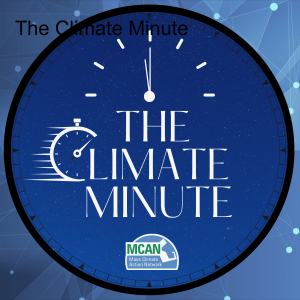
768.5K
Downloads
995
Episodes
The Climate Minute examines current news on global warming, climate change, renewable energy and the prospects for progress on international negotiations, carbon taxes and clean energy policy.
The Climate Minute examines current news on global warming, climate change, renewable energy and the prospects for progress on international negotiations, carbon taxes and clean energy policy.
Episodes

Wednesday Jan 04, 2023
“Don’t Look Up” one year later
Wednesday Jan 04, 2023
Wednesday Jan 04, 2023
Over the past year, the movie “Don’t Look Up” has been a streaming hit, logging hundreds of millions of viewing hours. What is it about the movie that made it big? With twelve months perspective, we watch again.

Friday Dec 30, 2022
A billion dollar brawl
Friday Dec 30, 2022
Friday Dec 30, 2022
The ‘oil and gas’ industry works to delay the adoption of climate friendly options for energy. Listen in as we discuss recent news on climate and what it all means.

Wednesday Dec 21, 2022
We wish you a Merry Solstice!
Wednesday Dec 21, 2022
Wednesday Dec 21, 2022
The arrival of the solstice is a chance to contemplate our place in the world, and what it means to be a climate activist. The Climate Minute wishes a happy Winter Solstice, 2022, to everyone.

Wednesday Dec 14, 2022
Activists take seats on an ISO Committee: “The taste of democracy was delicious”
Wednesday Dec 14, 2022
Wednesday Dec 14, 2022
ISO-NE is an important but poorly understood institution that controls the market for electricity. It needs to respond more effectively to the climate crisis. Recently, a group of activists were elected to ISO’s ‘Consumer Liaison Group.’ This is a good result, potentially turning an otherwise docile committee to a voice for public input. We speak with one of the activists recently elected to the CLG.

Sunday Dec 11, 2022
Nuclear weapons are still with us and still unthinkably dangerous
Sunday Dec 11, 2022
Sunday Dec 11, 2022
With the ominous threat of climate catastrophe clouding our future, it is easy to forget that the use of nuclear weapons could bring about immediate destruction on an unimaginable scale. The current ‘casual’ discussion of the possible use of tactical nuclear weapons in Ukraine brings home the reality of our risk. Dr Helen Caldicott is an iconic figure of the effort to abolish nuclear weapons. We speak with her about the issue and its relationship to the climate crisis.

Wednesday Dec 07, 2022
The peaker is coming, but Peabody residents already have higher health risks
Wednesday Dec 07, 2022
Wednesday Dec 07, 2022
After more than a year and a half of calling on the Massachusetts Office of Energy and Environmental Affairs to do their job and conduct a Comprehensive Health Impact Assessment (CHIA), MCAN took matters into its own hands and conducted a preliminary assessment of the health outcomes of communities that live near the proposed site of the Peabody Peaker. We talk to the author! The results from the study were deeply concerning and highlight the need for additional analysis on the impact the proposed Peabody Peaker will have on neighboring communities that are already overburdened.

Sunday Dec 04, 2022
Jeff Roy on prospects for 2023
Sunday Dec 04, 2022
Sunday Dec 04, 2022
As we head into the new year, we are joined by State Representative Jeffrey Roy, Chair of the TUE Committee, to discuss prospect for state level climate work next year.

Wednesday Nov 30, 2022
Thanksgiving Leftovers
Wednesday Nov 30, 2022
Wednesday Nov 30, 2022
There are more climate stories than we can discuss. In true Post-Thanksgiving fashion, we discuss the ‘left over” stories that happened in November. Thanks to DR Tucker for his research!

Wednesday Nov 23, 2022
The People’s Hearing on Equitable Building Decarbonization
Wednesday Nov 23, 2022
Wednesday Nov 23, 2022
Recently, MCAN and a coalition of elected officials, as well as public health, consumer, and climate advocates, held a People’s Hearing calling on the next administration to prioritize equitable building decarbonization and amending the specialized stretch code to be truly net-zero. Prioritizing decarbonization among new and existing buildings is critical to lowering the cost of utility bills, reducing the health effects of burning fossil fuels in homes, combating the climate crisis, and supporting the creation of new, good-paying jobs.
At a time when Massachusetts residents dependent on natural gas for home heating are facing an average 24% winter price spike, we need immediate assistance as well as longterm solutions that will protect our residents from rising costs while also rapidly transitioning our communities away from harmful and polluting fossil fuels.
By prioritizing significant investments in deep-energy retrofits for existing buildings like affordable housing and Environmental Justice Communities, and implementing an all-electric net-zero stretch code, the Healey administration and Massachusetts leaders can begin to wean the state off the expensive, volatile gas system and lower utility bills.
This past Tuesday, MCAN and a coalition of elected officials, as well as public health, consumer, and climate advocates, held a People’s Hearing calling on the next administration to prioritize equitable building decarbonization and amending the specialized stretch code to be truly net-zero. Prioritizing decarbonization among new and existing buildings is critical to lowering the cost of utility bills, reducing the health effects of burning fossil fuels in homes, combating the climate crisis, and supporting the creation of new, good-paying jobs.
At a time when Massachusetts residents dependent on natural gas for home heating are facing an average 24% winter price spike, we need immediate assistance as well as longterm solutions that will protect our residents from rising costs while also rapidly transitioning our communities away from harmful and polluting fossil fuels.
By prioritizing significant investments in deep-energy retrofits for existing buildings like affordable housing and Environmental Justice Communities, and implementing an all-electric net-zero stretch code, the Healey administration and Massachusetts leaders can begin to wean the state off the expensive, volatile gas system and lower utility bills.

Friday Nov 18, 2022
Climate politics in the mid-terms
Friday Nov 18, 2022
Friday Nov 18, 2022
The midterms are over. What are the take-away lessons for climate hawks? What comes next?
